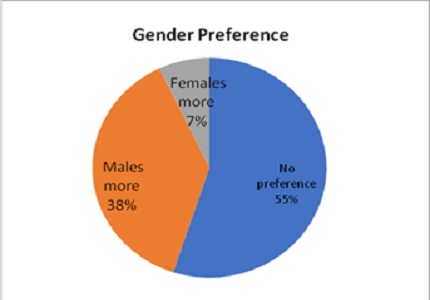Effects of awareness programme on the knowledge, attitude and practice of gender preference & pre-natal sex determination in population of Nasik district
Abstract
Introduction: India is facing a demographic nightmare in terms of gender imbalance, The worrying fact is the child sex ratio in Nashik district is 890 which is much lower than the national average of 919. This rate of decline is alarming. Though government has implemented PC & PNDT Act to prevent pre-natal sex determination, it seems not to be reflected in practice.
Aims & Objectives: To assess effect of awareness programme on the Knowledge, Attitude and Practice of Gender Preference & Pre-natal sex determination in population of Nashik district.
Materials and methods: A cross-sectional study was carried out in the antenatal ward of a tertiary care hospital, Nashik district. A total of 100 women were included and a pre-designed and pre-tested questionnaire was used. They were asked regarding the knowledge and attitude towards the PNDT Act. There was Awareness session on PC & PNDT act and Sex Ratio, post which the questionnaire was given again. Data was analyzed by using Statistical Package of Social Sciences (SPSS) v.22.0.
Results: In the Present Study, knowledge regarding PC&PNDT act was known by 88% participants. Gender preference of a particular sex in families was 45% which came down to 12% during the post awareness. Their desire to know gender of foetus came down to 4% from 15% after the awareness programme.
Conclusion: The existence of son preference is at an alarming high rate in our society and is the most important – the root cause of imbalanced sex ratio. Thus apart from the legislative measures, people also needs to be educated about the ethical issues related to female foeticide
Downloads
References
2. Office of Registrar General and Census Commissioner, India. Population in age group 0-6 years by sex and sex ratio (0-6). Census of India, Government of India. 2011. [Last accessed on 2011 Apr 09]. Provisional population totals. Available from: http://www.censusindia.gov.in/2011-prov-results/indiaatglance.html .
3. Provisional Population Totals. Government of India. Census Data 2011. 19 April 2014. Retrieved 22 April 2014.
4. Implementation of PCPNDT Act in India. Perspectives and Challenges. Public Health Foundation of India. Cited November 2013) Available from http://india.unfpa.org/drive/implementationofthepcpndtactinindiaperspectivesandChallenges.pdf.
5. Kanitkar T, Mistry M. Status of women in India - an interstate comparison. Indian J Soc Work 2000;61:381–3.
6. Handbook of PCPNDT Act and rules with amendments. Ministry of Health and Family Welfare Government of India 2006(cited 2013 October10).Available from: http://www.iria.in/uploadNotices/Handbook_on_PNDT_Act.pdf.
7. Dadwani Roma S. Tintu Thomas. “Knowledge Regarding Sex-Ratio& PCPNDTAct”. A Cross Sectional Study. International Jr. of Scientific Research vol.3 Issue-8, Aug.2014, 274-276.
8. Giri P, Nagaonkar S, Shidhaye R, Shidhaye P. Study of knowledge and attitude regarding prenatal diagnostic techniques act among the pregnant women at a tertiary care teaching hospital in Mumbai. Journal of Education and Health Promotion. 2012;1(1):36.
9. Nithin K, Tanuj K, Unnikrishnan B, Rekha T, Prasanna M, Vaman K, et al. Gender preferences among antenatal women: a cross-sectional study from coastal South India. African Health Sciences. 2015;15(2):560–66.
10. Khatri M, Acharya R, Sharma G (2012) Knowledge, Attitude and Practices (KAP) Related to Pre-Conception & Pre-Natal Diagnostic Techniques (PC & PNDT) Act Among the Antenatal Women in Bikaner. 1: 121. doi:10.4172/scientificreports.121.
11. Srivastava A, Singh JV, Singh OP, Singh VK, Singh N. Gender Preference, Attitude and Awareness of Young Eligible Couples towards Pre Natal Sex Determination in Lucknow District. Natl J Community Med 2014; 5(1): 148-152.
12. Christian Donald S, Sonaliya K N, Garsondiya Jignesh. Profiles, Practices and Perceptions towards Gender Preferences among Pregnant Women of Ahmedabad City, Gujarat, India.International Journal of Interdisciplinary and Multidisciplinary Studies. 2014: June; 1(6) 210-213.
13. Vadera BN, Joshi UK, Unadakat SV, Yadav BS, Yadav S. Study on Knowledge, attitude and practices regarding gender preference and female foeticide among pregnant women. Indian J Community Med. 2007;32:300–1.
14. Kansal R, Maroof KA, Bansal R, Parashar P. A hospital-based study on knowledge, attitude and practice of pregnant women on gender preference, prenatal sex determination and female feticide. Indian J Public Health. 2010 Oct-Dec;54(4):209-12. doi: 10.4103/0019-557X.77263.

Copyright (c) 2017 Author (s). Published by Siddharth Health Research and Social Welfare Society

This work is licensed under a Creative Commons Attribution 4.0 International License.


 OAI - Open Archives Initiative
OAI - Open Archives Initiative



















 Therapoid
Therapoid

